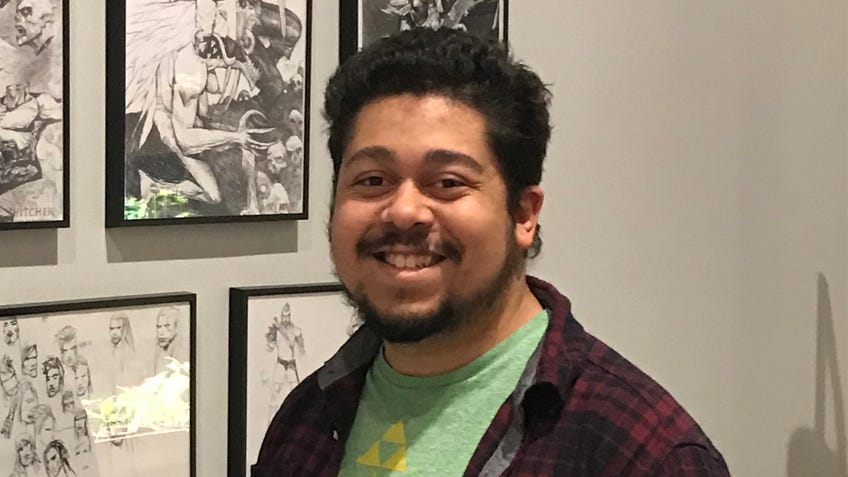Cyberpunk Red co-designer Cody Pondsmith on bringing the RPG’s future to the present, keeping its ‘80s style and building up to 2077
'Red was always kind of in development, but the video game really pushed it into overdrive.'
“I like to joke that I was raised to be a game designer, but actually a lot of me getting into game design was just sort of because it was always there,” says Cody Pondsmith. “Nobody ever forced me to be a game designer, it just was always in my life.”
Together with his father, Mike Pondsmith, and mother Lisa Pondsmith, Cody is a key creative force at R. Talsorian, the family-run roleplaying publisher behind the highly influential and acclaimed tabletop RPG Cyberpunk, first created by Mike in the late eighties.
Cyberpunk’s prophetic vision of the future and visceral gameplay has since spanned more than three decades both on and off the table, with its first edition’s future of 2013 later updated in its best-known nineties iteration Cyberpunk 2020, before leaping again to the 2030s in the mid-noughties V3.0.
As co-designer of the RPG’s fourth and latest edition, Cyberpunk Red - which launched a Jumpstart Kit last summer ahead of the full core rulebook’s release later this year - Cody is playing a central role in once again updating Cyberpunk’s vision of a gritty dystopian future. Red sees Cyberpunk’s world shared with a bigger audience than ever before, helped by its adaptation into upcoming blockbuster video game Cyberpunk 2077, set three decades after the tabletop game.
At last year’s PAX Unplugged, Cody kindly took the time to speak with me about working on Cyberpunk Red, collaborating with Cyberpunk 2077 developer CD Projekt Red, landing his first major RPG project - an adaptation of The Witcher - as a teenager and future plans for a brand new roleplaying vision of his own.
Cyberpunk has been around for a long time at this point. But it seems like partly thanks to the upcoming video game and roleplaying coming back into vogue in general that the thing everyone's talking about at the moment is Cyberpunk. It must be incredible from your side to have this game that has been going so long and updating each decade or so, yet always still feel like it's in the moment and people are really interested in it.
Cody Pondsmith: It is really wild to some extent. Cyberpunk as a franchise has at this point and will forever be older than older than myself. It’s interesting because it has always sort of been a mainstay of [R.] Talsorian. It’s largely what we're known for by most people. It's wild to have that in the first place. Every day at Gen Con and a lot of times at GAMA and stuff like that, we have people who just come up to the booth and they're just saying, "I grew up playing Cyberpunk, I played Cyberpunk when I was in university. Me and my roommates played Cyberpunk when we were in our apartment and we were like in our late teens or whatever." It's always fascinating because I don't have exactly that frame of reference. But it just means so much to so many people.
Mike has been excited to talk about what happens after 2020 for a really long time and he's finally getting the chance to put that to paper.
Obviously it's one of our favorite franchises in the company. We're always kind of working on it and Mike [Pondsmith] loves the world and really wanted to kind of move things forward, especially since 2020 sort of ends with this big cataclysm. Mike has been excited to talk about what happens after that for a really long time and he's finally getting the chance to actually put that to paper.
The nature of working with CDPR is really fascinating because it takes everything to that one step further. Lisa [Pondsmith] always likes to tell the story of when we got the email from CDPR: "Hey, we're CD Projekt Red. We worked on The Witcher and Witcher 2, and a lot of us grew up playing your game and we really want to make a video game based on your TRPG." We got this email and she came into the office and was like, "Hey Mike, we got this email from some guys in Poland who want to make a video game." And Mike was like, "Okay." [chuckles] It was, like, we're just entirely nonplussed because at this point we'd never heard of CDPR.
Was this before the release of The Witcher 3 really brought CD Projekt Red into the spotlight in 2015?
This was just as Witcher 2 was coming out [in 2011]. We didn't know them from Adam, so they sent us a copy of Witcher 2 as, like, proof of concept; to be like, "Look, we can do this thing." I played all the way through it. It's the only game I've ever played twice because I got an ending I didn't really like. Eventually we kind of came to the point where it's like, “Okay, they're not just like six guys in an office in Poland somewhere.”
It's fascinating to watch people who had been our fans for years and people who never knew who we were converge to love this franchise from all these different angles.
It's been fascinating to watch that evolve as we moved from this franchise that we love, and we have many, many, many, many, many fans who love, into this weird zone of moving so, so hard into this mainstream. Personally, I wake up and one of the things I do every morning when I get into work is check the 2077 subreddit. I'm always fascinated, because there's so many people out there who - even though the game hasn't even come out - are uploading their fan art and edits of the cover and the promotional pieces. And like, “This is my fan art of what my character is going to look like.” Just this amazing outpouring of love.
Of course, there's people getting weird about “This thing isn't what I expected” or people leaping to conclusions or whatnot. But it's fascinating to watch people who had been our fans for years and people who never knew who we were, but have heard of CDPR, all kind of converge to love this franchise from all these different angles.
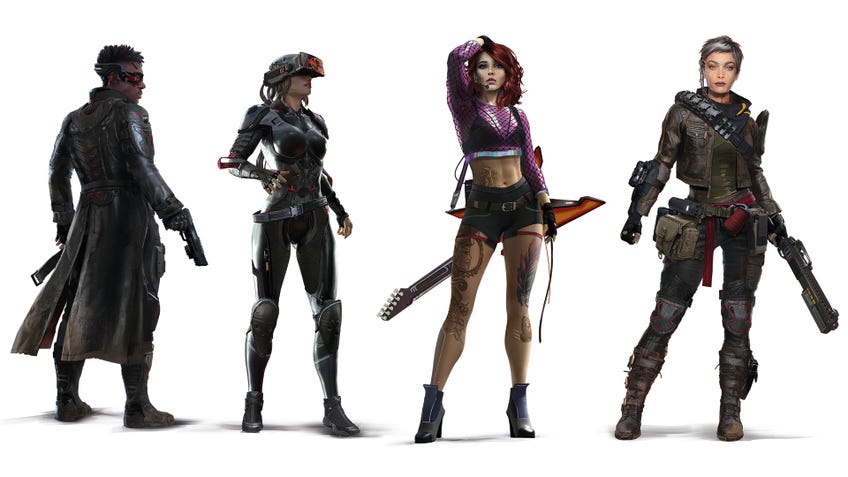
Was Red already in development when Cyberpunk 2077 first started discussion, or was it a response to the video game taking flight and knowing people will discover the tabletop RPG as a result?
Red was always kind of in development. Mike and I have a similarity, which I suppose is genetic or something, that we have a tendency to work on a lot of projects in the background. So Red had always kind of been in the background but as we got this stuff with CD[PR], we made sure that the timelines were unified in a lot of early meetings. Beyond the fact that we had always wanted to do something based on this, there was this really natural sort of evolution. We're already going to be establishing this time jump, so this is the perfect opportunity for us: as CD is coming in from one side, we come in from the other. We just moved closer and closer to sort of meeting in the middle. So it was kind of something that was always in the works. But I think that the whole deal with CD really pushed it into overdrive.
What are some of the points where you met in the middle between the video game and tabletop RPG?
Mike is in constant contact with the folks over at CDPR and they have these huge meetings where they go through if this is one unified timeline, how does this all happen? It's amazing because there's something really unique to building something that is a standalone game, but in a way sort of a prequel to another thing. It's this weird situation of me and James [Hutt], for instance, who's our other primary designer, do sort of a lot of the really nitty-gritty work on some of the cyberware and whatnot, to sit down with Mike and be like, "Well, we want to make sure that like there's pipe laid for some of this stuff in 2077." We have this cyberware in 2020 and they showed this thing in 2077 - what if we made something that was halfway in-between for Red in 2045? It is this really sort of fascinating cross-collaborative effort of working together - both working separately whilst sort of moving parallel.
The first Cyberpunk was set in 2013 because that was the far-flung future of the '80s. Then it was 2020. In Red, it's now 2045. How do you approach taking that step and predicting the future to some degree - but not so far that it's moving into futuristic Star Trek territory?
It was very interesting because we have this continued timeline and the jump from 2020 to 2077 gives this very large sort of gap, but it all kind of fits in because we tend to try to follow sort of like the big events in the world. At the end of 2020, we had the Fourth Corporate War and that wrecked a lot of stuff. More than just setting off a nuclear device in Night City and blowing up the centre of the city, it also - through what is effectively almost World War Three - destroys a lot of the infrastructure of the world economy. So the outgrowth of that is that Red is in 2045 because 2045 is when the world has started to sort of pull itself out of the aftermath of the Fourth Corporate War. Things have started to get back to the point where you're functioning kind of like you were in 2020 but with these changes based on the fact that now the world is recovering from this big event.
It's all about moving the tech forward while keeping it grounded to what it would really be.
Then we move forward through that, from 2045 we move to 2077, and there's a whole slew of events that happen. They inform how the timeline goes and the timeline sort of informs how they have to happen. So it's this wild sort of predictive game of we need this to end up here, so let's do these things or these things are happening so obviously this will happen later. To constantly update while still keeping the feel of Cyberpunk.
We have in the past gone too far into the future sci-fi transhumanist angles and it didn't work. So we always try to maintain with Cyberpunk that there's a throughline of feel that, even as it gets more futuristic, keeps it grounded. There's a reason that in 2020 we technically have laser cannons, but they're laser cannons that work on big chunky batteries that you put into them and they have four charges. We're not running around with blaster pistols and stuff. It's all about moving the tech forward while keeping it grounded to what it would really be.
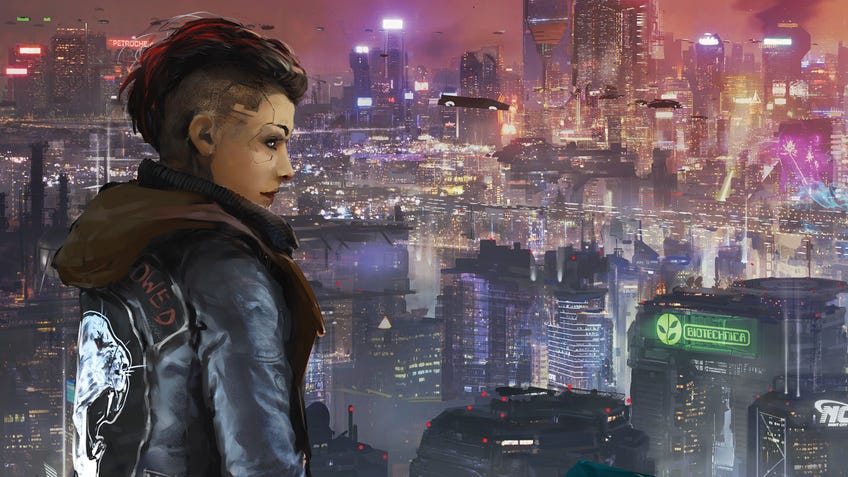
That was one of the things I thought while playing the Jumpstart Kit; it was recognisably Cyberpunk in that it was still that eighties vision of a cyberpunk future, despite being an RPG released in 2019. Has it been a challenge to juggle the original eighties roots and influences of the game, while also having its later editions feel like modern experiences?
If you move past big hair and neon clothing and stuff like that, a lot of the stuff that makes Cyberpunk feel like Cyberpunk continues forward.
It's a tricky balance to make. The great part that I've found - and this is mostly my [own] opinion on it - is that if you move past big hair and neon clothing and stuff like that, a lot of the stuff that makes Cyberpunk feel like Cyberpunk continues forward. Personally, while I draw from a lot of the cyberpunk stuff, you get this weird feeling at a certain point if you've worked on it long enough that you just sort of know what feels right and what doesn't. But a lot of the sort of tropes that Cyberpunk was built on originally have not really changed. A lot of the Red stuff is built on, like action films and thrillers and stuff like that, are just sort of concepts that even though it's not the eighties anymore, we've carried forward - these evergreen concepts that feel cyberpunk and make it feel cyberpunk.
RPGs such as D&D 5E have really cut back and are now pretty far from what they were in the ‘70s. There’s a lot of movement towards making things super streamlined so they’re not overwhelming for newcomers. But you don't want to lose what Cyberpunk is to play either. When you're returning to the core design and systems, how do you choose what to preserve for existing fans and what to modernise for a new audience?
Once again, it's a balance. Mike, James and I have worked on this really tirelessly because what we have found is basically the key is you have to keep the feel while making the rules that govern that feel run in a certain way. The vibe of what people expect out of roleplaying games and especially balances of system and flavor and stuff like that have changed as they constantly do - what people are looking for is constantly changing.
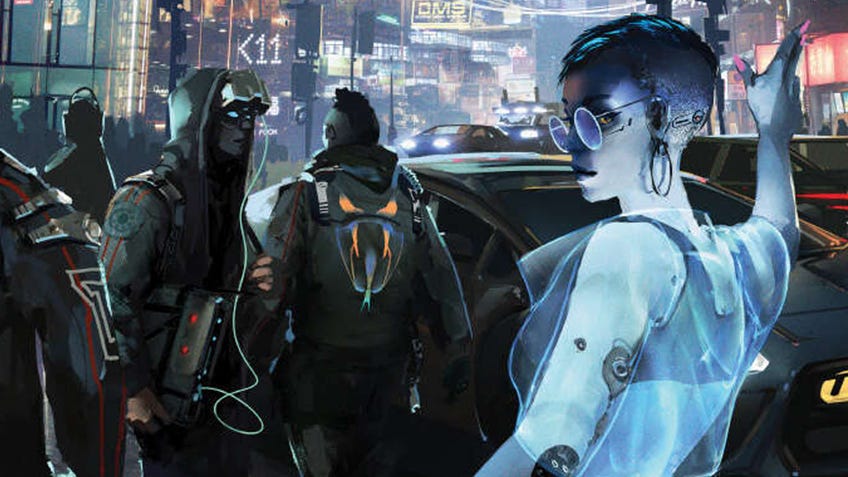
But you almost have to sit down and say like, "Okay, we know that we need to keep the ability to get your arm blown off by a shotgun because that's Cyberpunk; you get your arm blown off by a shotgun and then you go into the ripper doc and they cut off all the extra arm that was hanging off there and they put the cyber arm on it." We know we want to keep the ability to get crazy fashionware that makes your eyes fluoresce different colours and stuff like that because that's Cyberpunk. It's getting these technical implants for things that are not even necessarily a utility; they're style. As we say for Cyberpunks: "Style over substance."
And we want to keep combat that feels dangerous. We want to keep combat that you can always enter combat but you don't have that same sort of lackadaisical feeling of "Whatever, you know, I'll make it out." It’s that art of finding the bullet points of what makes it feel Cyberpunk and then saying, "Okay, now that we know that, we also know, for instance, we want to remove some of the additive math. So making a die roll doesn't take as long or you don't have to write out as many numbers." So how do we make that happen? How do we weave the system around our bullet points while still making sure that it hits all the beats that people are currently rolling with? It's kind of a weird balance to strike, but you know when you get it.
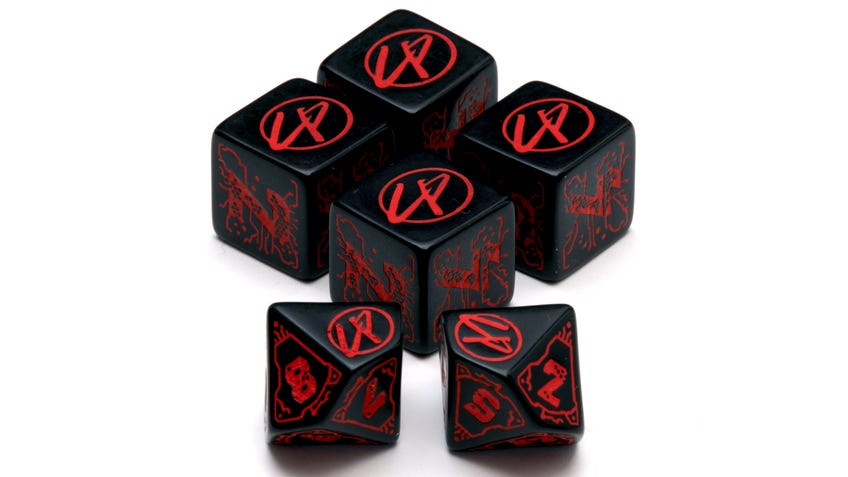
Outside of Cyberpunk, you adapted The Witcher into a tabletop RPG. Is that the first R. Talsorian project you led yourself as a designer?
Yes. I did the pitch for Witcher when I was 16 or 17. And over six years I worked on that project. That was six years of blood, sweat and tears that I poured into that book. That was interesting because it was this strange experience of trying to compile the feeling of a bunch of excellent novels by Andrzej Sapkowski and a bunch of video games by CDPR and trying to fit them together in a way that felt good and ran well and really made you feel like you were in the Witcher, whether you played the video games or you read the books or you did all of it. A lot of that was sort of by guess and by gosh - I'd change something a little bit and then I'd think through what does that affect and how is that going to make people feel about it? I rewrote a lot of a lot of things based on “This doesn't really feel right.”
I did the pitch for The Witcher when I was 16 or 17. I poured six years of blood, sweat and tears into that book.
One of the only sort of stipulations that CD had was that a lot of them are super huge Cyberpunk fans, and Cyperpunk and Witcher kind of mirror each other in a really interesting way - one is a fantasy and one is a sort of semi-future sci-fi - so they wanted the system to be based on Cyberpunk. But the thing that I had not entirely anticipated was that Cyberpunk is a system of gunfire. It is a system where melee weapons are what you do if you're specialised for melee weapons - you're a cool katana-wielding assassin or something or they have gotten close enough to you for your gun not to be the best option. Whereas Witcher is the exact opposite; Witcher is a melee world. Witcher is a world where if your opponent has a bow and arrow, they only use that bow and arrow until you can close with them. Or vice versa. So the focus is on melee, which led to a number of changes in the system to make it fit that melee focus - to make it feel like a game where the weight of the system was on that really personal, really close melee combat. That's part of the reason I put in the critical wound system that is in Witcher, because it gives you that sort of personal feeling - that you are not pointing a gun and firing, you are stabbing someone. It's a very different vibe. So it had to change the system to make it fit that vibe.
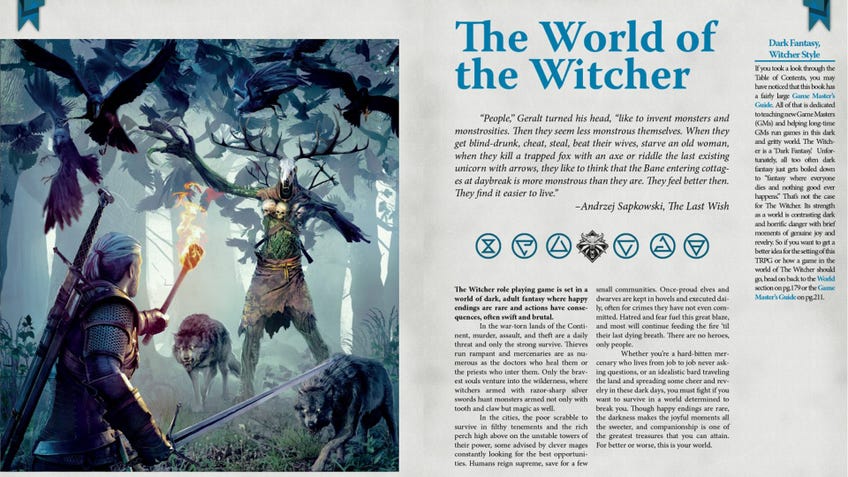
Do you have plans for an original setting of your own in the future? Or a system outside of the engine behind Cyberpunk and Witcher?
I have been working on my own system and my own setting for a while now. I can't say much about it because at some point it's gonna go into production but, yeah, I've got some stuff squirreled away that I've been working on for what feels like ages now. I’ve got to admit: while I love working with CD, I am kind of excited to work on something that is entirely our own property and something that I've built up from the ground up.
While R. Talsorian is best known for Cyberpunk, the publisher has plenty of other roleplaying games. Are any of those universes and settings you're really keen to expand or even to take into other mediums like video games so that more people can see and experience them, as with Cyberpunk?
I have been working on my own system and my own setting for a while now. I'm excited to work on something that I've built up from the ground up.
I love all our lines because they are all so different from each other. They all reflect another type of game. I have helped run a number of live-action events based on Castle Falkenstein which are always a complete hoot. There's something about getting a bunch of people in a room and telling them that they are now a bunch of diplomats trying to solve a world problem. We used to do live-action events where we'd get everybody in a room and we'd give them all like agendas and stuff like that. And we'd have little snacks and Martinelli's apple cider for champagne. It's just delightful to see people slowly meld into the character and really do their best to kind of play the character. I love Castle Falkenstein. I would love to see, at some point, more focus on that.
Teenagers from Outer Space, our anime comedy series, is a great introductory game. It's all run off d6s, you have like five stats and it's all super simple math. You do have to have a sense of humour about yourself though, because it is a comedy game. You have to be willing to laugh at yourself and laugh at others and have other people laugh at you sometimes. But it's an amazingly fun game and there've been some really amazing Let's Plays of it. And Mekton, of course: giant anime robots, always fun. It's such a great game. It's one of Mike's favourites and there's so much exciting world stuff that he's built up about it that I would love to explore.
This interview has been edited for clarity and length.
